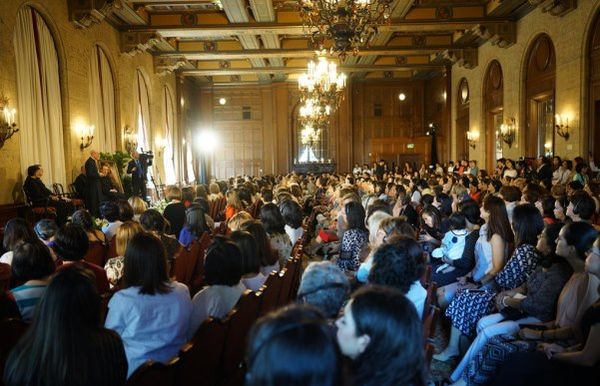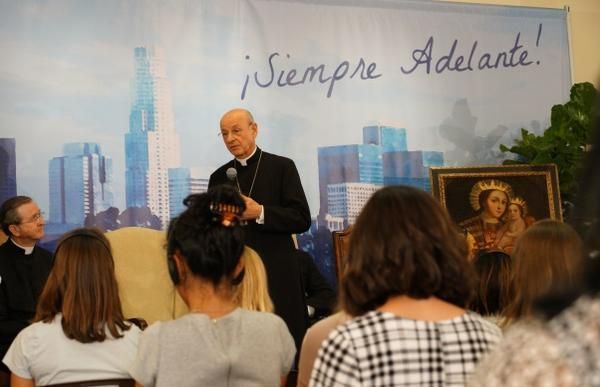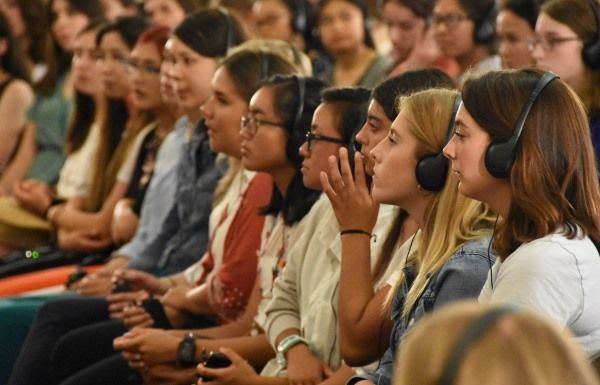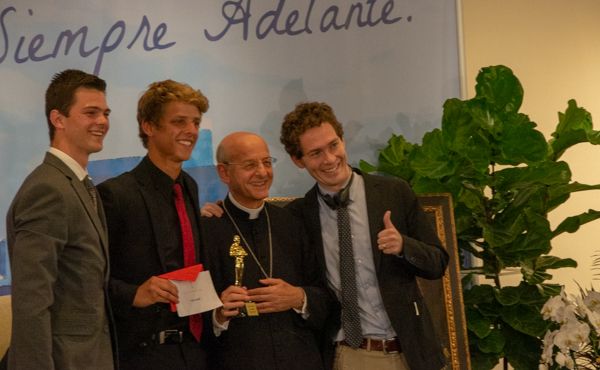Saturday, July 27
Monsignor Ocáriz met with two large groups of members and friends of the Prelature today, first with about 500 men, and later a similar number of women, in Los Angeles.
In the morning get-together, the first question came from Jim, a former Marine and the father of 10 children. He asked the Prelate how to help children overcome peer pressure and how to teach them the true meaning of human sexuality.
“The first thing,” the Prelate said, “is to be personally convinced that purity is a great good that is essential for human dignity.” Making reference to the principle that “the corruption of the best is the worst,” he said that “sex is a very noble reality created by God for the transmission of life, and so its corruption is one of the worst things. Saint Josemaria used to say that it completely blinds a person. So we shouldn’t see the struggle for purity as a negation, that you can’t or you mustn’t do this, but rather as the affirmation of human dignity. And the dignity for which sexuality has been created is for the transmission of life in matrimony.” To overcome temptations, he said, “we should pray, for our own purity, and the purity of everyone.” The Prelate also said we should know that anything that happens can always be remedied, because we always have God's forgiveness when needed, particularly in the sacrament of confession.
Lito, age 83, the first supernumerary member of Opus Dei in Los Angeles, asked how people his own age can help younger people draw closer to God. Lito said that seeing his “younger brothers in the Work,” he feels like “Yoda with young Luke Skywalker.” The Prelate answered that “the first means, prayer, is the most important.” He suggested that Lito find opportunities to meet children or grandchildren of friends.“You can also help people your own age to come closer to God. Older people also have a soul. The apostolate has no borders, it has no shores, it is an open sea. Therefore, friendship. The apostolate is fundamentally friendship.”
Tim, an Oscar-nominated movie producer, asked how he could have a positive impact on the movie industry, especially since the prevailing culture can be unfriendly towards Christian values. The Prelate said that, in addition to personal friendship, the important thing is to “produce works of entertainment that are technically of good quality, and at the same time that communicate an inspiring message, not necessarily an explicitly Christian one, although sometimes this will be the case.” The Prelate added that “what is counterproductive is to present a Christian message in a technically poor way.”
In the afternoon, the Prelate met with women taking part in apostolic activities of Opus Dei. As this was his last get-together in the United States, those present expressed their deep gratitude to him for making this trip around the country and giving of himself in his many encounters with faithful and friends of Opus Dei. Their questions touched on the topics of freedom, the vocation of one’s children, friendship, and fashion, among others.
Margaret, a mother of 11 children, lives in Silicon Valley, “near the headquarters of Apple, Google, and Facebook.” She told the Prelate that the economic prosperity of this area can create confusion between wants and needs and make it difficult to foster the virtue of detachment in her children and friends. The Prelate encouraged her to first of all give an example herself of how to live happily without acquiring many things, “keeping in mind that this is closely related to interior freedom. Because of our weakness, we are all capable of ending up slaves to material things. To lose one’s joy because we lack something is to be a slave to that object.” In contrast, “detachment from material goods makes us freer to love people because when the heart is very attached to material things, to purely material desires, our strength to love people is lessened. The human heart has a very great capacity to expand but it also has the capacity to shrink. Ultimately, we should see the spirit of Christian poverty above all as the freedom to love.”
Lucy spoke about the tendency towards individualism that can tarnish family life and asked the Prelate how we can encourage others to not be afraid to ask for help. Monsignor Ocáriz referred to the Gospel scene where Jesus asks the Samaritan woman for a drink of water: “being who He is, being God, being Omnipotent, He could have worked a miracle and gotten the water without needing a well or anything. But no, the Lord wanted to need us. He gives us an example of knowing how to ask for help.” He went on to say that “individualism has two versions – not asking for help and not giving it, not being concerned about the others. We must fight against this because the essence of the Christian life is charity.”

Jen and Megan provided a break from the questions with a jazzy interpretation of “What a Wonderful World.” Both are from Orange County, south of Los Angeles. They told the Prelate that the song reminded them of Saint Josemaría’s message to “passionately love the world.”
As the get-together was coming to an end, Mary Collette asked the Prelate to share his hopes for the United States, now that he has seen so much of the country. He replied: “That you be faithful and that you multiply. Not simply because we want to be many but in order to help many people, because this is what our Lord wants.”
Friday, July 26
Monsignor Fernando Ocáriz has reached his final stop in the United States – the state of California. On Friday July 26, in Los Angeles, he met with two groups of young people, first women and then men, in the Catholic Center of the University of Southern California.

The young women from the Los Angeles area came prepared to provide musical accompaniment for the get-together with the Prelate. Lucy and Kayla, two high school sophomores, played ukuleles and sang “The Best Day of My Life” to welcome him. Samy, a resident at Westfield Residence who is studying ethnomusicology at UCLA, ended the gathering by playing the trumpet in a lively mariachi with her two sisters accompanying her on the violin and guitar.
Samantha, a freshman at University of California-Berkeley, asked how she could best explain the role of Opus Dei in the Church. The Prelate replied: “The Church’s path is very wide and encompasses many different ways of traveling towards the same goal. Everyone in the Church forms the Mystical Body of Christ, and therefore we are all united and are heading in the same direction, even though there are different ways of arriving there. What is proper to Opus Dei is that it has come to remind people (it is not an invention but a reminder of something that is at the heart of the Gospel) that all of us are called to be holy, that holiness is not only for some special people. Moreover, not only are we all called to be saints, but all noble and clean human endeavors are a path to sanctity. Certainly the path to holiness requires prayer and the sacraments, but also ordinary life, work and family life – all this is also a path to sanctity.”

When Kayla asked how to discern God’s specific call, the vocation that God has in mind for someone, the Prelate had the opportunity to clarify what the universal call to holiness truly entails. To be a saint does not mean being people without any defects. The perfection in holiness that God asks of us is the perfection of love shown, as Saint Josemaría so often insisted, in personal struggle, in the effort to love ever more fully, even though we have to begin again many times, to begin and begin again. Saint Josemaría also said, “A saint is a person who struggles.” A saint is a person who fights and who gets up and begins again when they make a mistake.
Being in Los Angeles, it was fitting that one of the questions came from Alana, a young actress and singer in the theater. She asked Monsignor Ocáriz how to preserve Catholic values in an environment that is often ideologically opposed to them. The Prelate responded that “in this kind of environment, one needs to distinguish between the people who have wrong ideas and the wrong actions themselves. We cannot despise anyone nor treat anyone badly.” He said that a solid formation is needed in order to give good reasons for the truth of the Catholic faith: not only revealed truths but also truths open to human reason. Also the concept of truth itself needs to be clarified, refuting the mistaken idea “that the truth does not precede my actions, but rather the truth is what I do, the product of my actions.”
Later that day, the Prelate had a get-together at the same location with young men involved in the Prelature’s apostolic activities. He began by stressing the importance of getting to know Christ better. “Read the Gospel often and put yourself into the scenes to get to know our Lord better. This will give us the strength we need to bring Him to others, and therefore to bring them happiness. Christian life is inseparable from the personal effort to get to know and love Christ better, and the desire and effort to make Him known to others.”
One question came from Chao, a doctoral student from mainland China, who is studying geophysics at Stanford. He first learned about God nine years ago from a member of Opus Dei in Shanghai. There are no centers of the Prelature in mainland China, so Chao would meet with friends in private houses for get-togethers and catechism classes. What could he do, he asked, to help Opus Dei begin in mainland China?
“The first thing we have to do is pray,” the Prelate said. “That may seem simplistic, but all of Opus Dei’s apostolic work (like that of the Church, since Opus Dei is part of the Church) is a supernatural endeavor. It is not simply a human endeavor, one of strategy or salesmanship, like a merely human enterprise. Therefore the most important thing is to rely on God—in everything related to spreading the Gospel, both in China and in the whole world.”

Jim, a high school student sophomore from Pasadena, asked how he could make compatible the time needed for prayer with a demanding schedule of sports, jobs, and other extracurricular activities. The Prelate stressed the importance of the virtue of order, “because with order, time is better used.” Hence the importance of having a “plan of life,” with certain set times for prayer and reading the Gospel, and other times for work and study. “Through disorder we spend more time than is needed to accomplish things,” he said.
An amusing moment came when Tim, an Oscar-nominated producer, presented the Prelate with an honorary “Oscar” to commemorate his visit to Los Angeles, the center of the U.S. film industry. Tim said he kept on his desk a picture of Walt Disney holding a copy of The Way – a reminder of the great mission Catholic filmmakers have.
The Prelate ended by stressing the importance of friendship in order to share their ideals with others. “When there is friendship,” he said, “a friendship that is mutual, it is a form of love. Love is a deeply human reality that brings joy, and that has many different expressions. Love between spouses, between parents, between brothers, and also between friends who desire the other person’s true good. This is to love truly. To desire the good of the other person. And when this friendship exists, you can spontaneously pass on what you have inside, the formation you have received, the ideas that make you happy and give direction to your life.”

